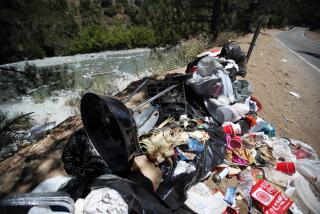Environmentalists Pitch Their Concerns to TV
- Share via
SANTA BARBARA — Television executives love “disease-of-the-week” movies, but are they ready for “disease-of-the-earth” ones? If Alex Keaton recycled his soda pop cans on “Family Ties,” would the youth of America follow?
That’s what a small group of TV writers, producers, directors and executives mulled over with some of the nation’s top environmentalists last weekend at the National Council for Families and Television’s annual conference, co-sponsored with the Caucus for Producers, Writers and Directors.
Few A-list TV industry notables attended the three-day confab at Santa Barbara’s Four Season’s Biltmore Hotel. NBC, Home Box Office and Fox Broadcasting sent programming executives, CBS sent a business-affairs representative, and no one from ABC was on the official list of participants.
But those TV industry participants who made the trip up the coast heard sobering details about the rapidly deteriorating state of the environment from World Wildlife Fund board chairman Russell Train, United Nations environmental program director Noel Brown and Environmental Defense Fund scientists Michael Oppenheimer and Ellen Silbergeld.
(They also heard a rather perplexing plan for saving the environment through a new people’s television network from consumer advocate Ralph Nader, but more on that later.)
The environment has not been one of prime-time television’s favorite topics, as producer-writer Leonard Stern--whose credits include “Get Smart,” “The Steve Allen Show” and “McMillan and Wife”--acknowledged Friday at the conference’s opening dinner.
“We had an episode on ‘The Governor & J.J.’ about air pollution that the network censors scrapped because the subject was too controversial,” said Stern, who wondered at the time, “Was there a pro-pollution group? A garbage lobby?”
Since then, he added, “the industry has acquired a modest backbone.”
But backbone or no, even environmentalists acknowledged that the subject matter is difficult to cover on television. But that didn’t stop the conference speakers from exhorting audience members to try.
“Live TV broadcast signals--like the environment--do not respect national boundaries,” keynote speaker Train said, asking participants to do for the environment “what ‘MASH’ did for war.”
When asked what he’d do if a network gave him commitments for three TV movies, Train--head of the Environmental Protection Agency from 1973-77--said he’d devote the time to the “greenhouse effect” (the current warming of the Earth because of carbon dioxide trapped in the atmosphere); the depletion of the earth’s ozone layer and the destruction of the tropical rain forests (which experts say could be extinct in 60 years at the current cutting rate).
“However, I realize the public would have problems putting such subjects into a personal perspective,” Train said. “I guess maybe solid waste and trash would be better.”
Most of the environmentalists didn’t worry about how their subject matter would be creatively presented, but they weren’t without humor in making their often grim presentations to an audience whose business is largely happy endings.
“I’d rather be out on the beach watching the oil derricks that the oil companies kindly provided for the fish,” Michael Oppenheimer said before his presentation. “But to talk about other things--even arms control--is like re-arranging deck chairs on the Titanic.”
Oppenheimer presented a bleak scenario of life in Los Angeles if nothing is done to stop the earth’s warming trend: four times as many days over 100 degrees; 30 more days over 90 degrees, a diminishing coastline due to the melting polar icecaps and subsequent rise of the ocean, but increasing water shortages from less snow run-off each spring.
There were audible gasps from audience members when, during her presentation, Ellen Silbergeld told of the hazards in breast-feeding due to the current lead content in mothers’ milk.
Noel Brown of the United Nations discussed the use of Third World countries as “garbage dumps” for developed nations--a point underscored by a story in The Times on Sunday about a plan to dump Los Angeles’ sludge in Guatemala. (The proposal collapsed when the Guatemalan government backed out of the deal.)
Representatives from Chevron Oil and Stroh’s Brewery were also on hand to give an “industry perspective” on the environment. Chevron’s James Sullivan, who attended earlier sessions where the hazards of toxic wastes were discussed in great detail, told the group: “There are are no unsafe substances, just unsafe levels.”
Stroh’s Raymond Gross discussed his firm’s sponsorship of Audubon wildlife specials on Turner Broadcasting and public-TV. But a participant asked about pollutants emitted by breweries.
“There’s nothing wrong with beer,” the brewery’s director of corporate planning and development replied, “beer’s good for you.”
Some of the audience members said that speaker Ralph Nader didn’t seem to understand the purpose of the conference. Rather than addressing specific environmental concerns and how they could be presented on TV, Nader used his appearance to promote the creation of the Audience Network--which, he said, would be unfettered by corporate interests. When asked if he wasn’t describing the already-existing Public Broadcasting Service, Nader accused PBS of being conservative and largely funded by corporations.
He was taken to task, however, by Blaine Baggett, director of national public affairs programming for KCET Channel 28. Baggett pointed out that most of PBS’ funding came from viewers and added that shows like “Frontline” could “hardly be described as conservative.”
Baggett and Nader huddled in discussion later, but as the KCET official noted, “If he gets his facts on public broadcasting that messed up, what other facts is he getting wrong?
Producer Marion Rees, while an admirer of Nader’s, confessed to finding his idea “a bit naive.”
Nader was asked what his subject matter would be if he were given only one TV movie commitment--his first and last ever.
His answer was instantaneous: “That’s easy--I’d do it on the networks!”
More to Read
The complete guide to home viewing
Get Screen Gab for everything about the TV shows and streaming movies everyone’s talking about.
You may occasionally receive promotional content from the Los Angeles Times.






